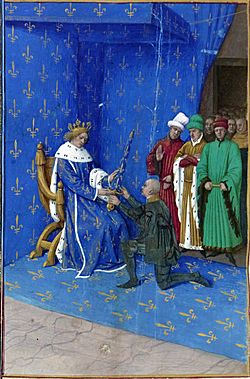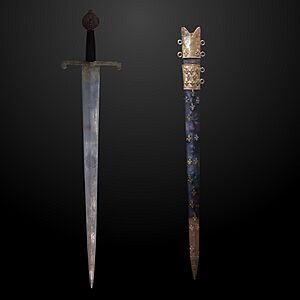Constable of France facts for kids

The Constable of France (called Connétable de France in French) was a very important job in the old French kingdom. It was like being the King's top military helper and the main commander of the French army. The word "Constable" comes from a Latin phrase meaning "count of the stables," but the job grew to be much bigger than just looking after horses!
The Constable was also in charge of military justice. This meant they made sure soldiers followed the rules. Their area of power was called the Constabulary.
Contents
What Was the Constable of France?
This important role was created by King Philip I in 1060 AD. Alberic was the very first Constable. The Constable was one of the five original "Great Officers of the Crown." These were the most important officials who helped the King rule.
The Constable was the highest-ranking person in the army. They were the commander-in-chief of the King's army. This job was so powerful that it was eventually ended in 1627. Cardinal Richelieu, a powerful advisor to the King, abolished the role. He did this to make sure the King had direct control over his army.
After the Constable's job was removed, a new, less powerful title was created. This was the "Marshal General of the King's camps and armies." This person was still a top military leader. But they did not have the same wide political powers as the old Constable of France.
The Constable's Special Sword
The special symbol of the Constable's job was a fancy sword. It was called Joyeuse. This name came from the legendary sword of Charlemagne, a famous old emperor.
Joyeuse was a very old and important sword. It was used in the ceremonies where French Kings were crowned. The sword was kept in a blue scabbard, which is its cover. This scabbard was decorated with the royal symbol, the fleur-de-lis. When a new Constable took office, the King himself would give them this special sword.
Who Did the Constable Command?
After another important job, the "Great Seneschal," was removed in 1191, the Constable became the most important military officer. They were ranked right after the King's closest advisors, called "peers." The Constable acted like the King's main general across the entire kingdom.
The Constable was in charge of all military officers. This included the powerful "Marshals of France." They were also responsible for making sure the army had enough money. And they handled military justice, making sure soldiers followed the law.
People Under the Constable's Command
Here are some of the important military leaders who worked under the Constable:
- Marshal of France (Maréchal de France): These were high-ranking generals.
- Colonel-general: These generals commanded all regiments of a specific type of soldier. For example, all cavalry or all infantry.
- General
- Lieutenant-general: This was the highest regular general rank. Officers could earn this rank based on their skill and experience.
- Maréchal de camp (literally "Camp Marshal"): This was the lowest general officer rank. Today, it's like a "brigadier-general."
- Porte-Oriflamme: This was an honorary position. It gave someone the right to carry the King's special royal banner, called the Oriflamme, into battle.
- Grand Master of Crossbowmen: This person was in charge of all archers in the army.
Who Was Not Under the Constable's Command?
- Grand Master of Artillery: From the 1600s, this person was in charge of all cannons and artillery. They reported directly to the King, not the Constable.
- Lieutenant-general of the Realm: This was not a military rank. It was a special job given by the King during big problems. For example, during a civil war or if the King was very sick. This person would be in charge of the whole kingdom. They would even command the Constable of France! The King would choose a royal prince for this role.
Famous Constables of France
Many important people held the title of Constable of France over the centuries. Here are a few notable ones:
- Mathieu II le Grand (1218–1231): Known as "the Great," he was a powerful Constable.
- Bertrand du Guesclin (1370–1380): A famous knight and military leader. He was known for his bravery and skill in battle.
- Olivier V de Clisson (1380–1392): Another important military figure.
- Charles d'Albret (1402–1411 and 1413–1415): He was Constable during the Battle of Agincourt in 1415, where he sadly died.
- Anne de Montmorency (1538–1567): A very influential noble and military commander.
- François de Bonne, Duke of Lesdiguières (1622–1626): He was the last person to hold the full title of Constable before it was abolished.
The Constable in Napoleon's Time
Much later, during the time of Emperor Napoléon Bonaparte, the title of "Constable" was brought back. But it was only an honorary title, meaning it was just for show. Napoleon gave this title to his younger brother, Louis Bonaparte, and to his chief of staff, Louis Alexandre Berthier. These titles disappeared when Napoleon's rule ended.
The Constable in Movies
The Constable of France has appeared in several movies:
- The 1938 movie If I Were King shows a character named François Villon being appointed Constable for one week by King Louis XI.
- Different movie versions of Shakespeare's play Henry V show Constable Charles d'Albret. He was Constable during the Battle of Agincourt in 1415. He is played by Leo Genn in the 1944 film, by Richard Easton in the 1989 film, and by Maxime Lefrancois in the 2012 film. In these movies, his death in battle is shown in different ways.
See also
- Constable
- Lord High Constable
- Joan of Arc – Some people believe she was also appointed Constable of France by King Charles VII.
 | Kyle Baker |
 | Joseph Yoakum |
 | Laura Wheeler Waring |
 | Henry Ossawa Tanner |


